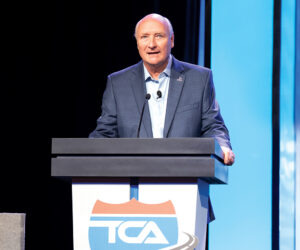“Mr. Fixit” was a popular Canadian instructional series that aired on CBC Television from 1955 to 1965.
The series demonstrated home repairs and construction by Peter Whittall, who was nicknamed Mr. Fixit. The show concentrated on basic repair and construction techniques.
Fast-forward 56 years and you might say President Joe Biden hopes to become America’s “Mr. Fixit” with the $2.3 trillion infrastructure improvement plan that he has labeled the American Jobs Plan.
“It’s a fix plan,” said Truckload Carriers Association’s Manager of Government Affairs Kathryn Pobre. The plan includes $155 billion for repair of roads and bridges that the president said would modernize 20,000 miles of highways, roads, and main streets; fix 10 of the most economically significant bridges in need of reconstruction; and repair the worst 10,000 smaller bridges, thus “providing critical linkages to communities.”
Considering the number of miles of highways and the number of bridges in the National Highway System (NHS) the fix is only a Band-Aid.
The 20,000 miles in Biden’s plan represent only 12.1% of the 164,000 total miles in the NHS.
There are 145,904 bridges in the NHS, 75,123 of which are rated “fair” and 4,579 of which are rated “poor.” That’s 54.6% of NHS bridges that are in fair or poor condition.
Pobre added, “Biden’s methodology is at first not focusing on creating new roads, but repairing what’s broken now, so $115 billion is just a drop in the bucket.” Much more is needed to really raise the grades of roads and bridges on the 2021 American Society of Civil Engineers (ASCE) Report Card for American’s Infrastructure, which rated the overall infrastructure a “C” and bridges were graded at “C” and roads received a “D.”
“Growing wear and tear on our nation’s roads have left 43% of our public roads in poor or mediocre condition, a number that has remained stagnant over the past several years,” the ASCE reported.
Pobre said the Biden administration is so anxious about passing the bill amidst Republican opposition that they are likely to move it through the reconciliation process, which would require only a simple majority vote in the Senate, with the deciding vote cast by Vice President Kamala Harris.
For trucking, there might be an upside to reconciliation, Pobre pointed out, because the Biden proposal includes the Protecting the Right to Organize Act, known as the PRO Act. TCA opposes the PRO Act, which among other things, (1) revises the definitions of employee, supervisor, and employer to broaden the scope of individuals covered by the fair labor standards and threatens the independent contractor model used by trucking; (2) permits labor organizations to encourage participation of union members in strikes initiated by employees represented by a different labor organization (i.e., secondary strikes); and
(3) prohibits employers from bringing claims against unions that conduct such secondary strikes.
“Using reconciliation significantly constrains what they’re allowed to include in the bill because it must be tied to revenues and spending or toward increasing the debt limit,” said Pobre, adding she didn’t feel the PRO Act would meet any of those requirements.
“It’s not a plan that tinkers around the edges,” Biden said in support of his proposal. “It’s a once-in-a-generation investment in America unlike anything we’ve seen or done since we built the interstate highway system and the space race decades ago. In fact, it’s the largest American jobs investment since World War II. It will create millions of jobs, good-paying jobs.”
Another hope for really improving the road and bridge system lies with the fate of the Moving Forward Act, a $1.5 trillion highway reauthorization bill designed to replace the Fixing America’s Surface Transportation (FAST) Act, which was originally set to expire September 30, 2020, but through a continuing resolution was extended until September 30, 2021.
The Moving Forward Act was passed by the House July 1, 2020, but ran into solid Republican opposition in the Senate.
The act included $300 billion for repairing bridges and roads.
Known as H.R. 2, the bill will have to be reintroduced in the current Congressional session, and like Biden’s American Jobs Plan, H.R. 2 set forth no mechanisms for funding.
“I think lawmakers are trying to get a new highway reauthorization bill introduced soon,” said Pobre. “We anticipate it to resemble H.R. 2, but now that the American Jobs Plan is out there, we are waiting to see what it will look like.”
Two Democratic leaders say they’ll use a different approach to crafting the bill this year.
Rep. Peter DeFazio (D-ORE-4), chairman of the House Transportation and Infrastructure Committee, and Rep. Eleanor Holmes Norton (D-DC), chair of the Subcommittee on Highway and Transit, said the new process will provide members of Congress the ability to submit requests for highway designations that are consistent with state and local infrastructure plans.
In developing the Moving Forward Act, DeFazio said his committee processed more than 700 amendments.
It is the amendments that sometimes bog down a bill and even cause it never to become law, said TCA’s Vice President of Government Affairs David Heller.
That might include bills of speed limiters, minimum liability insurance, truck parking, women in trucking, underride guards on trailers, and the PRO Act should it be taken out of Biden’s bill, Heller said.
Pobre said it will be hard to pass a reauthorization bill with the current partisan climate in Congress, and because there is a limit on how often lawmakers can use reconciliation, Democrats will have to be strategic to successfully achieve a landmark infrastructure bill in addition to their other priorities.
Lyndon Finney’s publishing career spans over 55 years beginning with a reporter position with the Southwest Times Record in Fort Smith, Arkansas, in 1965. Since then he’s been a newspaper editor at the Southwest Times Record, served five years as assistant managing editor of the Arkansas Democrat-Gazette in Little Rock and from November 2004 through December 2019 served as editor of The Trucker. Between newspaper jobs he spent 14 years as director of communications at Baptist Health, Arkansas’ largest healthcare system. In addition to his publishing career he served for 46 years as organist at Little Rock’s largest Baptist church.















